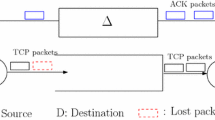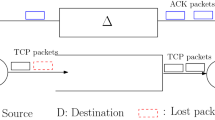Abstract
In this paper we describe an analytical approach to estimate the performance of greedy and short-livedTCPconnections, assuming that only the primitive network parameters are known, and deriving from them round trip time, loss probability and throughput of TCP connections, as well as average completion times in the case of short-lived TCP flows. It exploits the queuing network paradigm to develop one or more ‘TCP sub-models’ and a ‘network sub-model,’ that are iteratively solved until convergence. Our modeling approach allows taking into consideration different TCP versions and multi-bottleneck networks, producing solutions at small computational cost. Numerical results for some simple single and multi-bottleneck network topologies are used to prove the accuracy of the analytical performance predictions, and to discuss the common practice of applying to short-lived TCP flows the performance predictions computed in the case of greedy TCP connections.
This work was supported by the Italian Ministry for University and Scientific Research through the PLANET-IP Project.
Access this chapter
Tax calculation will be finalised at checkout
Purchases are for personal use only
Preview
Unable to display preview. Download preview PDF.
Similar content being viewed by others
References
L. Kleinrock, “Queueing Systems, Vol. II: Computer Applications,” John Wiley, 1976.
V. Paxson, “Empirically-Derived Analytic Models of Wide-Area TCP Connections,” IEEE/ACM Transactions on Networking, 2(4):316–336, August 1994.
J. Padhye, V. Firoiu, D. Towsley, and J. Kurose, “Modeling TCP Throughput:ASimple Model and its Empirical Validation,” Proceedings of the ACM SIGCOMM’98-ACM Computer Communication Review, 28(4):303–314, September 1998.
N. Cardwell, S. Savage, T. Anderson, “Modeling TCP Latency,” Infocom 2000, Tel Aviv, Israel, March 2000.
T. Bonald, “Comparison of TCP Reno and TCPVegas: Efficiency and Fairness”, Performance Evaluation, No. 36-37, pp. 307–332, Elsevier Science, Aug. 1999
V. Mishra, W. B. Gong, D. Towsley, “Fluid-based Analysis of a Network of AQM Routers Supporting TCP Flows with and application to RED”, in Proc. SIGCOMM’2000, Aug. 28-Sept. 1 2000, Stockholm, Sweden.
A. Kumar, “Comparative Performance Analysis of Versions of TCP in a Local Network with a Lossy Link,” IEEE/ACM Transactions on Networking, 6(4):485–498, August 1998.
C. Casetti, M. Meo, “ANewApproach to Model the Stationary Behavior ofTCPConnections,” Infocom 2000, Tel Aviv, Israel, March 2000.
C. Casetti, M. Meo, “Modeling the Stationary Behavior of TCP-Reno Connections,” International Workshop QoS-IP, M. Ajmone Marsan, A. Bianco Ed., Lecture Notes in Computer Science 1989, Springer, 2001.
R. Lo Cigno, M. Gerla, “Modeling Window Based Congestion Control Protocols with Many Flows”, Performance Evaluation, No. 36-37, pp. 289–306, Elsevier Science, Aug. 1999
M. Garetto, R. Lo Cigno, M. Meo, M. Ajmone Marsan, “A Detailed and Accurate Closed Queueing Network Model of Many Interacting TCP Flows,” in Proc. IEEE Infocom 2001, April 22-26, Anchorage, Alaska, USA. An extended version of this paper, submitted for publication, is available URL: http://www1.tlc.polito.it/locigno/papers/info01_extended.ps
M. Garetto, R. Lo Cigno, M. Meo, E. Alessio, M. Ajmone Marsan, “Modeling Short-Lived TCP Connections with Open Multiclass Queuing Networks,” subm. for publication, URL: http://www1.tlc.polito.it/locigno/papers/TCP_OMQN.ps
E. Alessio, M. Garetto, R. Lo Cigno, M. Meo, M. Ajmone Marsan, “Analytical Estimation of the Completion Time of Mixed NewReno and Tahoe TCP Traffic over Single and Multiple Bottleneck Networks,” submitted to IEEE Globecom 2001
W. Stevens, “TCP Slow Start, Congestion Avoidance, Fast Retransmit, and Fast Recovery Algorithms,” RFC 2001, IETF, Jan. 1997
P. Karn, C. Partridge, “Improving Round-Trip Time Estimates in Reliable Transport Protocols,” Computer Communication Review, Vol. 17, No. 5, pp. 2–7, Aug. 1987.
W. R. Stevens. TCP/IP Illustrated, vol. 1. Addison Wesley, Reading, MA, USA, 1994.
ns-2, network simulator (ver.2), Lawrence Berkeley Laboratory, URL: http://wwwmash.cs.berkeley.edu/ns.
Author information
Authors and Affiliations
Editor information
Editors and Affiliations
Rights and permissions
Copyright information
© 2001 Springer-Verlag Berlin Heidelberg
About this paper
Cite this paper
Garetto, M., Lo Cigno, R., Meo, M., Marsan, M.A. (2001). On the Use of Queueing Network Models to Predict the Performance of TCP Connections. In: Palazzo, S. (eds) Evolutionary Trends of the Internet. IWDC 2001. Lecture Notes in Computer Science, vol 2170. Springer, Berlin, Heidelberg. https://doi.org/10.1007/3-540-45400-4_35
Download citation
DOI: https://doi.org/10.1007/3-540-45400-4_35
Published:
Publisher Name: Springer, Berlin, Heidelberg
Print ISBN: 978-3-540-42592-2
Online ISBN: 978-3-540-45400-7
eBook Packages: Springer Book Archive




